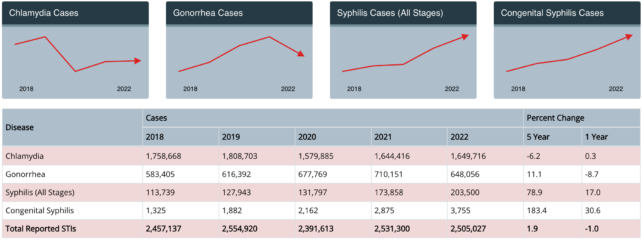The National Coalition of STD Directors has declared that the United States is presently facing a sexually transmitted infection (STI) epidemic that is “out-of-control.” The warning comes after the release of annual STI data by the US Centers for Disease Control and Prevention (CDC). The online announcement on the CDC website immediately expresses the collective frustration of public health officials: “Yet again, more than 2.5 million cases of chlamydia, gonorrhea, and syphilis were reported in the United States.”
 Trends in annual reported STI cases from 2018 to 2022. (CDC)Chlamydia remains the most common STI in the US, having held the top spot for several years. However, the recent surge in syphilis cases is causing the most concern among health officials. Data from the CDC shows an 80 percent increase in syphilis cases of all stages over the past five years.
Trends in annual reported STI cases from 2018 to 2022. (CDC)Chlamydia remains the most common STI in the US, having held the top spot for several years. However, the recent surge in syphilis cases is causing the most concern among health officials. Data from the CDC shows an 80 percent increase in syphilis cases of all stages over the past five years.
Although most people associate STIs with adults, syphilis poses a threat to babies as well. When a child acquires syphilis from the mother during pregnancy or birth, it is referred to as congenital syphilis. In 2022, the US officially reported over 3,700 cases of congenital syphilis, representing a 937 percent increase over the last decade. While syphilis can be effectively treated with the appropriate antibiotics, if left undiagnosed and untreated, it can cause irreversible harm to the body, particularly in infants, leading to developmental delays, seizures, or even death.
Syphilis in adults is typically transmitted through vaginal, anal, or oral sex and progresses through stages. The initial stage typically manifests as sores around the mouth or genitals, while the secondary stage can result in rashes on the body and flu-like symptoms such as fever, headache, sore throat, and fatigue. These early stages are when the infection is most contagious. The disease rarely advances to the third stage, which can affect the organs and prove fatal.
The approximately 10 percent annual increase in early syphilis stages is highly alarming and poses a threat to the health of infants across the nation. In just one year, cases of congenital syphilis increased by 31 percent in the US, with black or African American children being disproportionately affected. Although almost every state reported a case of congenital syphilis in 2022, Texas, California, Arizona, Florida, and Louisiana accounted for 57 percent of all reports.
Laura Bachmann, the CDC Director for STD Prevention, lamented that these infections resulted in 282 stillbirths and infant deaths in 2022. Experts emphasize that timely syphilis testing and treatment during pregnancy could have prevented 88 percent of these cases.Why this is not happening remains a central question. According to Bachmann, “The STI field has reached a tipping point. We have long known that these infections are common, but we have not faced such severe effects of syphilis in decades. Recent public health emergencies diverted program resources and threatened the health of those already disproportionately affected by STIs. We must move now to pick up the pieces.”
CDC officials are urging swift innovation and collaboration from all public health experts involved in STI prevention, and their calls are supported by numerous health associations, including the National Association of County and City Health Officials (NACCHO), the American Sexual Health Association, the American Academy of Family Physicians, and the National Coalition of STD Directors (NCSDDC). The NCSDDC emphasized the need for urgent action, stating that the nation is facing a rapidly deteriorating public health crisis with real lives at stake, especially in the case of syphilis.
While President Biden has created a multi-agency plan to address the increase in STI cases in the US, there are uncertainties regarding funding for the initiative. The NCSDDC previously warned that if President Biden continued to reduce health funding overall, his efforts toward STI prevention would inevitably falter. The NCSDDC acknowledged the federal leadership’s focus on addressing the severe consequences of the nation’s STI epidemic, particularly congenital syphilis, but stressed that federal leadership would be ineffective if communities lacked the necessary funding to execute the proposed measures.
Experts Confirm: US Is Dealing With an ‘Out-of-Control’ STI Epidemic












